Unibit
12
12
|
I was sooo happy the first time I used my unibit. I guess that goes for everyone.
Thinks soon took a dark turn though. I bought it from ebay, the listing is no more, the name is "4-32MM Step Conical Cone Drill Bit Hole Cutter Titanium Nitride Coated". It was 14 euros with shipping. For the first 2-3 boxes all was good, but then it started gathering aluminum in its grooves at the point where it wouldn't go deeper. So I cleaned it with a screwdriver and hammer and went on. I must have drilled about 20 boxes with it by now. I just came from a drilling session where things became frustrating. It would gather aluminum every two holes or so. I pressed harder every time to go to the next step, both unibit and enclosure could not be touched afterwards by the heat produced. The holes get less smooth every time. Apart from the tiring bit of cleaning it every 2 holes, I got two monster holes. While I pressed to get to the next step, it got two steps ahead before I reacted... I never heard anything like these after a year and a half reading the forums, so I have to ask. Is it the unibit? (probably) I get most of my enclosures from tayda, and I can say they are always the same, but somewhat different. Can it be the poor quality enclosures that cause my frustration? |
|
Are you lubricating the bit before using?
|
|
In reply to this post by Zanius
Cast aluminium is actually really abrasive, and can easilly bind up in a thick, welded on layer on a cutting bit if it is not really sharp. The technical term for this is galling. The more galling you get, the hotter it gets, and the hotter it gets, the more galling you get!
This is what you are experiencing here, and it is usually caused by a blunt bit, and/or too high drill speed. You need to prevent the galling from happening in the first place. Run you drill slow - real slow. Easy if you have a pillar drill, not so easy if you are using a variable speed hand drill. Use a firm pressure on the bit to force it to cut instead of just rubbing. Rubbing just makes it hotter, and more likely to gall up. And Jack is right, use some cutting oil or cutting paste to keep it cool. Hope this helps. |
|
Galling! Good to know the term!
I never before thought of lubrication... The moment I read Jack's reply an image popped in my head with water (?) flushing over industrial drills. That makes sense... I ll take a walk by the nearby hardware store and get some! I use a hand drill (my father's) witch is quite old and it has gone through some repairs. The outcome of those is that you can't change the speed knob (maybe i can install a tap tempo switch lol). I can make it go slowly by not pressing the button so hard, but that frequently leads to the unibit getting stuck in the hole. Gotta work on my drilling skills then! Thanks for the enlightenment guys! While at it, any advice on how to clean up the aluminum that has built up besides beating it? I guess that would take some chemical compount that I don't wanna mess with... (grabs the hammer) |
|
Administrator
|
I wonder if you may have ruined the bit right off the bat with the screwdriver and hammer, or if you just got a bad bit. I've been using the same unibit for several years with no issues, and I have never cleaned or sharpened the bit. I don't lubricate the bit at all either
|
|
Same situation as Travis over here. I use a drill press though. Lubrication seems to be your best bet, and I don't really know of any way to remove galling easily other than sheer force, seeing as it's an actual fusion of materials. I imagine trying to remove the galling will at best destroy the cutting edges of the bit.
Through all the worry and pain we move on
|
|
This post was updated on .
"Same situation as Travis over here. I use a drill press though. Lubrication seems to be your best bet, and I don't really know of any way to remove galling easily other than sheer force, seeing as it's an actual fusion of materials. I imagine trying to remove the galling will at best destroy the cutting edges of the bit."
The best way to remove it, is to use a very small (needle) file and very carefully file it away. This should work - the file is harder than the aluminium build-up, but not as hard as the Unibit, so you should be able to file it away without damaging the Unibit. Don't hit it with a hammer and chisel (screwdriver)! The Unibit should be so hard as to be almost as brittle as glass, so it's really easy to chip the cutting edge, which will just cause it to chew it's way through the enclosure and gall up more. All this supposes you have good Unibit though. Some bargain ones are made from crap quality steel, that is nowhere near hard enough so blunts easily, and may not even be ground properly, with the wrong rake and clearance angles. They may look the part, but just won't cut right. The other way to strip off galling is to drill it into a block of mild steel or any other soft steel (with lubrication). This will do the trick. BTW Travis, if you are using the right speed and feed rate, any decent drill or unibit should last years cutting enclosures without any lubrication, so you are doing it right. I don't use use lube on my drills, but I don't use a unibit. As an ex-toolmaker, I have enough twist drills to last a lifetime! |
|
Good to know! Perhaps one of those tricks will work for you.
Through all the worry and pain we move on
|
|
Ok, gathered enough things I didn't know.
One more thing, what would you say is a good price for one? I tried not buying the cheapest one I found, but didn't know enough on the subject at the time, and I guess I bought a fairly cheap one just to try it out. |
|
Administrator
|
In reply to this post by Beaker
Beaker I've been meaning to ask - should I get a spring loaded center punch or the kind that I hit with a hammer? I normally just apply a piece of masking tape and mark my hole locations with a pencil and compound square, then just drill through the center of the mark. But a center punch would probably make it a little more fool proof.
Zanius I'm not an expert but my bit has lasted me a long time and it cost around $40-$50 USD. I thought that was too expensive at the time but the store only had that one and it was the right size, so I got it and thankfully it has been worth the cash. One thing I should mention is that I only drill aluminum with the unibit. If I need to drill steel I will use another set of bits so that I don't wear out the unibit. Not sure if this is really necessary or not, but steel seems to really wear out my bits. Beaker is the expert here! |
|
I'm not beaker, but I can tell you that I do use a manual center punch and a dead-blow mallet to start my holes. Makes it easier IME. I'll let him answer the thing about spring vs. manual 'cause I have no idea.
I got three bits for $20 in a massive sale and they've lasted me a long time, save for the one my dad used to bore through some insane hardened steel to make brackets once (which is thoroughly dead now).
Through all the worry and pain we move on
|
|
In reply to this post by Zanius
I'm not sure that price is a good guide. I've used one of these bits, 3 for $8 or so, for about 10 enclosures so far with no problem at all: http://amzn.to/1Z1fcdg . I have a cheap Harbor Freight drill press that I run at the slowest speed, and lubricate the bit with WD40. At that price, I can easily replace it when it wears out, but it's showing no signs of that so far.
|
|
This post was updated on .
In reply to this post by Zanius
Personally, I'd go for something like these:
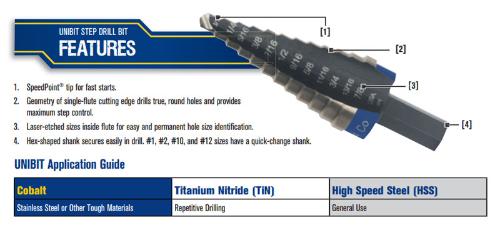 This is an Irwin brand unibit - you can see it incorporates a centre drill at the tip, which is crucial in my opinion. Also comes in three different materials - Cobalt, TiN treated (gold coloured finish), or High Speed Steel. Any of these is suitable for aluminiumn enclosures. I'm guessing the HSS one is cheapest?? I'd go with that - more than man enough for the job. I would look for country of manufacture - If it's made in USA, Europe or Japan it should be a good one. If it's made in China or does not say where it's made, best avoid. Having said that, it's predominately American companies who make these things, so Irwin, Klein and Drill Hog are the ones you see most often. All of these brands get my recommendation - they will last decades. Jack has a valid point though - if used properly from day one, even a cheap Lidl or Aldi bit should be ok for occasional use - if it's a good one to start with! Again, just personally speaking, but I would avoid using a Unibit unless you have a drill press (or pillar drill if you are British). Like most of the other guys who have commented, I have a pillar drill, and the extra power, control and accuracy you can get, is vital. Be very careful if you are using a hand drill - Unibits are the type of bit that is easy to cause it to snatch and throw the workpiece around the room, so watch your fingers! Edit: It's worth bearing in mind that proper titanium nitride (TiN) "coating" is done in a high temperature vacuum chamber. TiN vapour literally soaks into the surface of the cutting tool, leaving a treated skin of TiN a few microns deep, and a layer of TiN on top. This can increase the life of the tool considerably as it is lower friction, and resists chipping. Cheap TiN tools just get the same treatment as jewellery and decoratvce car parts - a quick dunk that just colours the surface gold, does nothing to prolong the life, and rubs off easily in use. |
|
In reply to this post by Travis
"Beaker I've been meaning to ask - should I get a spring loaded center punch or the kind that I hit with a hammer? I normally just apply a piece of masking tape and mark my hole locations with a pencil and compound square, then just drill through the center of the mark. But a center punch would probably make it a little more fool proof."
Both have pros and cons depending on use and material, but for pedal enclosures either will do just as well - no real difference. It might just depend on what you are used to. When I started making pedals, I used a punch and a mallet. Now I just use my spring auto punch. |
|
In reply to this post by Zanius
I am in the same boat as you. About 30 pedals in, and I remove the galling with a flat head screwdriver, kinda wedging it out.
Maybe a higher quality uninitialized is in order! |
|
Administrator
|
In reply to this post by Beaker
only thing to be aware if you use a punch you hit with a hammer, if you hit it too hard the aluminum will dent. i did that a few times when i didn't realize that i hit it to hard and had to knock the metal back into place. no big deal, just remember aluminum is rather soft.
|
|
This post was updated on .
In reply to this post by Zanius
I've drilled a few hundred boxes from Tayda, Mammoth, PPP, and some off the wall Chinese sources using a cheap set of stepped bits from Harbor Freight. Identical to these.
I think I paid around $9 for them 3 years ago and they're still going strong. (I pretty much only use one of them) The bits do collect aluminum in the flutes, but every once in a while I just pop it out with a small flathead screwdriver by hand. I use a spring loaded automatic center punch (also from Harbor Freight) to mark the holes, then drill a 1/8" pilot hole using my drill press. After that I do the actual drilling with the stepped bit using my normal handheld power drill with no lubrication of any sort. Never had a problem. How fast are you guys running these things? If you're generating that kind of heat it sounds like you've got the bit moving too fast. I have the bit spinning slow enough that I could count the revolutions by eye. It drops maybe one step per second. I've only put the stepped bit in the drill press a couple times.... I don't have a vice on my press and I'm too afraid of what might happen if one of those things snagged the enclosure at that rate of speed. This is a little jig I made out of scrap stripboard for drilling top-mounted jacks in an enclosure. I just slip it over the end of the enclosure then mark the holes using a spring loaded center punch. The piece that fits on the inside of the enclosure locks it in place so they come out perfectly aligned every time. 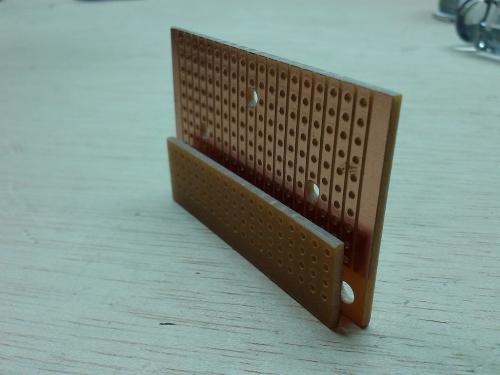 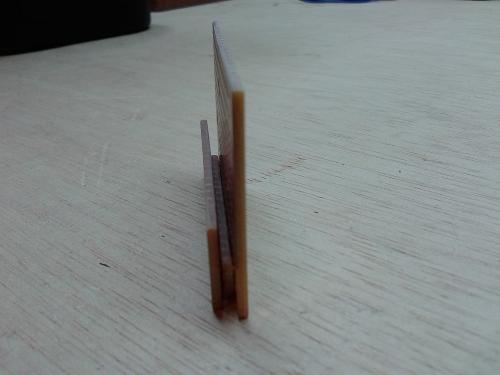 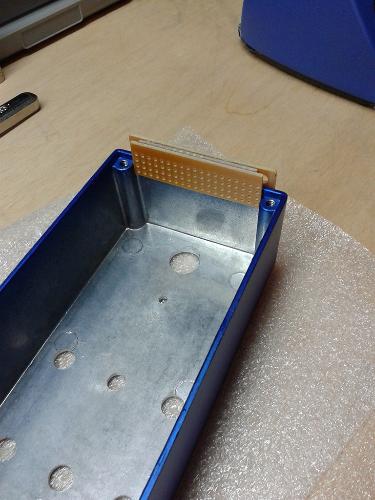 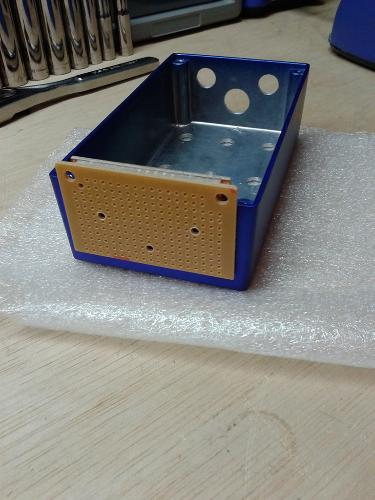
|
|
That's a pretty neat idea.
You also don't have to run a drill press very fast if you don't want to, it's just about the precision and stability it offers.
Through all the worry and pain we move on
|
|
Mine is a cheap 5-speed model, the slowest setting is 760RPM.... Waaay too fast for me to comfortably use a stepped bit.
|
|
In reply to this post by Zanius
re unit thread.An engineer friend insists that when filing aluminium white spirit should be used as a lubricant.Try this trick and see if it helps
|
«
Return to Open Chat
|
1 view|%1 views
| Free forum by Nabble | Edit this page |

